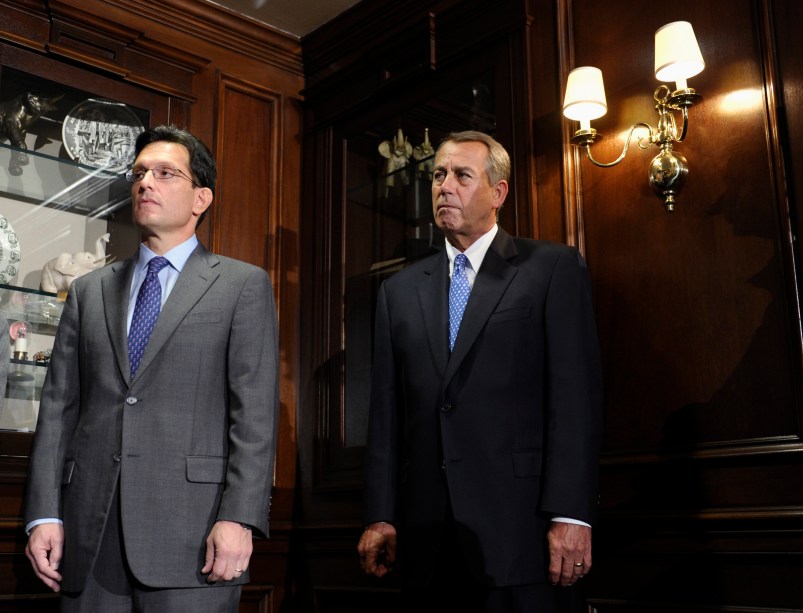Republicans may need immigration reform to avoid extinction in the long run, but there’s a growing fear within the party that bringing it up now — as House GOP leaders have laid the groundwork to do by releasing a pro-reform blueprint — would depress conservative voter turnout and damage their standing in the 2014 elections.
“No way it happens. I just don’t see it going anywhere,” said one House Republican aide, speaking candidly on condition of anonymity. “I think 2014 is a slam dunk to us otherwise and this would really piss off the base.”
Dan Holler, a spokesman for Heritage Action, the wealthy conservative lobbying group, warned GOP leaders not to follow through with reform. “The principles released by GOP leaders are a clear embrace of amnesty, and that could hurt the party in November,” he told TPM.
Some conservatives oppose reform on the merits and may be using these arguments to scare the party into inaction. But they may still have a point: mid-term elections tend to be decided in large part by turnout, and a significant faction of conservatives see immigration reform as an existential threat to the country — and the Republican Party. Seeing their party abandon their views on such an emotionally charged issue could motivate them to stay home on Nov. 4.
“There is actually something to the premise,” said Jack Pitney, a political scientist at Claremont McKenna College. “In the long run, Republicans have to do better with Hispanic voters. But candidates don’t run in the long run — they run in the election that’s coming up. Most House Republicans do not have large Hispanic constituencies, and a decline in the base vote could cost them some otherwise winnable seats.”
And as the Cook Political Report pointed out last year, of the 108 minority-majority districts in the House, Republicans represent just nine of them. The average House Republican represents a district that is 75 percent white, which may mean these congressman face little pressure from their constituents to take up the issue.

John Sides, a political science professor at George Washington University, doubts that reform would hurt Republicans much in the November congressional elections, arguing that few voters condition their turnout on “complete agreement” with their party’s agenda. “For immigration reform to demobilize voters,” he said, “I think it needs to be a focus of the campaign, and in the seats up for grabs, I’m not sure that would happen.”
While veteran GOP operatives and nationally ambitious Republicans are content to accept some short-term political pain in order to secure the long-term gains of immigration reform, numerous influential conservatives are making their gripes known.
The Weekly Standard’s Bill Kristol warned that an immigration debate “could blow up GOP chances for a good 2014.” The Washington Examiner’s Philip Klein, deriding Speaker John Boehner as the “fool in the shower,” argued that “in terms of the raw politics of 2014, introducing [immigration] now is bananas.” He warned that passage of reform would “boost Democrats’ prospects in 2014 by demoralizing the GOP base and elevating President Obama.” The National Review’s Andrew McCarthy said the leadership’s immigration plan was, among other things, “deeply offensive to the GOP’s already disgruntled conservative base, ensuring that droves of them will sit out the 2014 midterms.”
These are concerns that House Republican leaders will have to grapple with in the coming weeks and months as they weigh the merits of writing and advancing legislation that reflects their new blueprint, which endorses legal status (without the promise of citizenship) for people living in the country illegally.
House Budget Chair Paul Ryan (WI), who supports reform, said it’s “clearly in doubt” whether the House can pass an immigration bill that reaches the president’s desk in 2014.
“This is not one of those issues where it has some kind of a deadline behind it, like, say, a government shutdown, which forces us into a compromise we might not like to take,” Ryan said Sunday on ABC’s “This Week.” He portrayed the GOP leadership’s blueprint as a take-it-or-leave-it proposition — if even that: “This is a ‘here are our standards, this is our approach, if you want to do it this way, this is what we’re willing to do.’ And we’re still having a debate in our caucus about even that.”
Many conservatives vigorously oppose immigration reform on substance, so the only reason GOP leaders are even considering it is the devastating longer-term politics on inaction. If that imperative is thrown in doubt, achieving reform this year will become a heavier lift, particularly ahead of the primaries, where numerous Republicans are fending off conservative challengers.
“Immigration reform could help them with the electorate of the future,” said Pitney, “but at the expense of the electorate of the present.”






